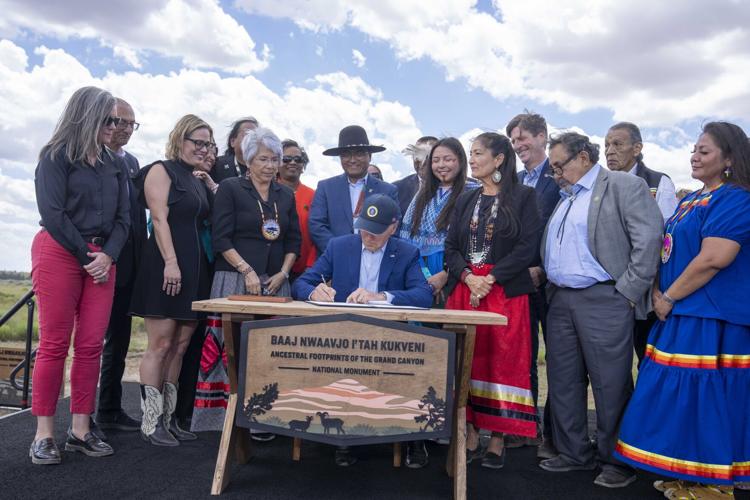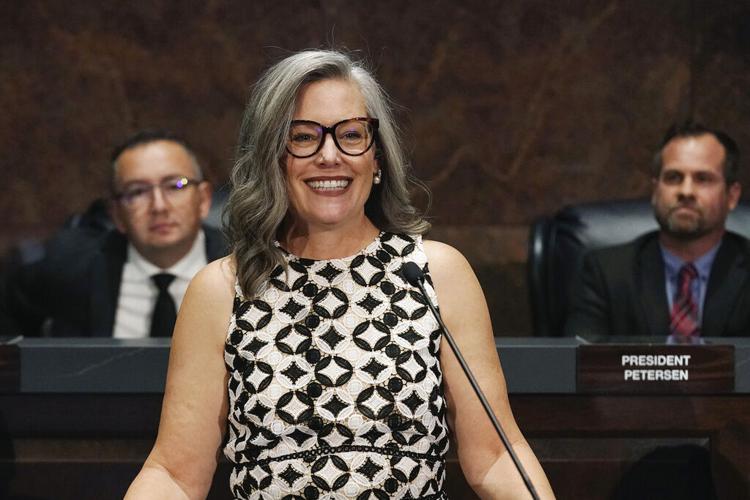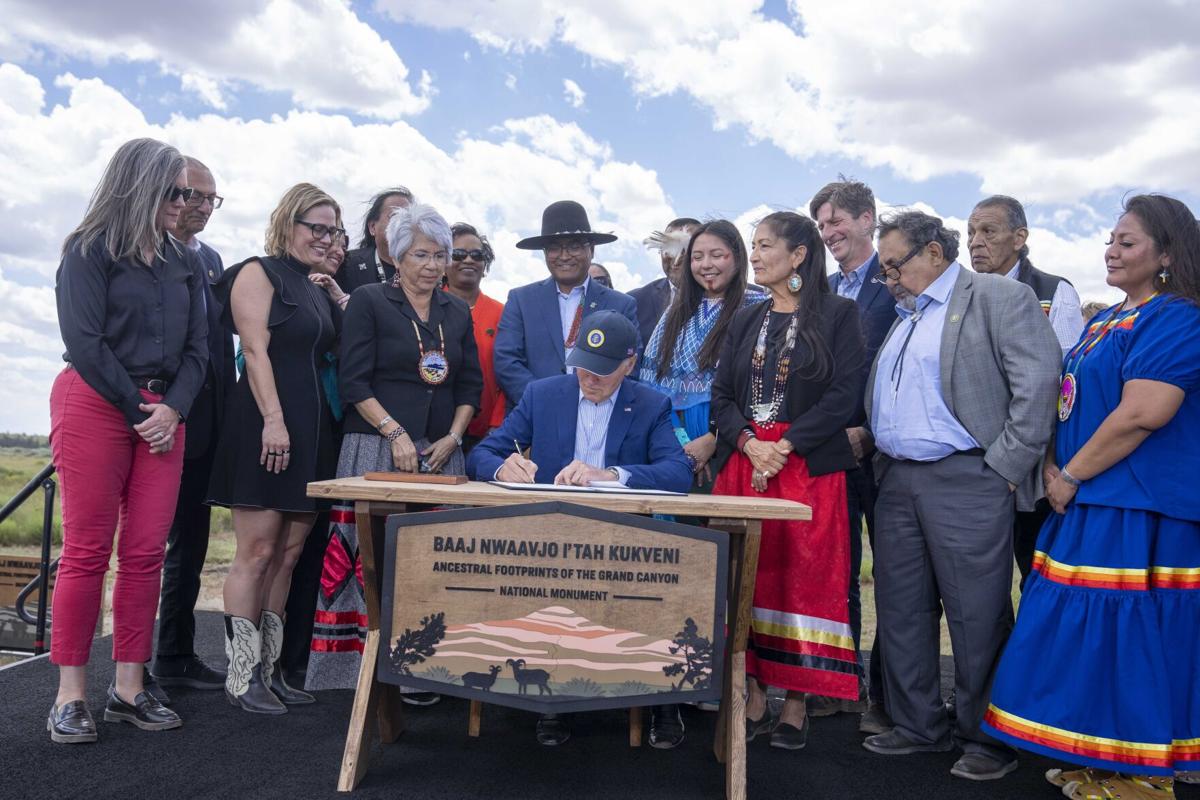PHOENIX — Arizona’s top legislative Republicans filed suit Monday against President Joe Biden over his designation last year of nearly 1 million acres of federal land near the Grand Canyon as a national monument.
They call it an unlawful “land grab.’’
Senate President Warren Petersen and House Speaker Ben Toma also cite the uranium deposits in the area, which are inaccessible within the national monument. That undermines the ability of Arizona utilities to get the fuel they need for power plants, their lawsuit in federal court says.
Attorneys for Petersen and Toma acknowledge that the 1906 federal Antiquities Act allows a president to set aside parcels of land for protection.
But they say such a proclamation has to be limited to historic landmarks, historic and prehistoric structures and other objects of historic or scientific interest. They argue that such designations have to be confined to the “smallest area compatible’’ with the care and management of the items to be protected.
And they contend the Baaj Nwaajo I’tah Kukeveni Ancestral Footprints of the Grand Canyon National Monument — the formal name for 1,462 square miles of the site — meets neither requirement.
“Congress passed the Antiquities Act to protect just that: antiquities,’’ the lawsuit says. “It did not pass the law to allow the Biden administration to declare every inch of federal land a federal forest, cut off from all but those it selects.’’
All of the designated lands are already federal property. But Petersen and Toma contend the state is harmed by the designation because it will make it more difficult to manage its own lands, which are adjacent to the new monument.
Also, they say, “A significant portion of energy produced and consumed in Arizona comes from nuclear power,’’ with the figure in 2022 hitting 29% of total electricity net generation in the state.
Domestic nuclear energy production is dependent on foreign imports of uranium for the moment, the lawsuit says. That puts nuclear power at risk if foreign nations suspend uranium exports to the United States, it says.
“There is every reason to believe such a risk exists,’’ Petersen and Toma’s lawsuit says. “Many uranium imports come from foreign companies owned by nations, like Russia, with interests adverse to the interests of the United States and who ‘leverage’ their control over those companies `to further geopolitical ambitions.’ ‘’
Utilities aside, the two say there’s a financial impact on the state — and its residents and businesses — because of the ban on new mining within the monument, given the fees and tax dollars generated to the state and Mohave County.
“Diminishing the tax contribution from the mining operations will simply shift the tax burden to other parties or require governments to cut necessary services,’’ they claim.
Petersen and Toma also say new uranium mining would be economically beneficial to area communities. They cite a 2009 study that indicated uranium mining would provide a $29 billion benefit to local economies in northern Arizona and southern Utah over 42 years.
While the monument designation permanently blocks new uranium claims, it allows current grazing leases, hunting and fishing and other activities to continue. And Arizona will continue to have control of fish and wildlife issues.
The Biden administration, through the Interior Department, declined to comment.
According to the White House, the formal name for the monument translates in part to “where Indigenous peoples roam’’ in Havasupai and to “our ancestral footprints’’ in Hopi. The administration said at the time Biden came to Arizona to sign the proclamation that the monument is designed to preserve thousands of cultural and sacred sites that are significant for a dozen Indian tribes that have lived in the area.
Utah lawsuit thrown out
Getting a court to rule in the state’s favor could prove difficult.

Democratic Gov. Katie Hobbs flanked by Speaker of the House Ben Toma, left, R-Glendale, and Senate President Warren Petersen, R-Gilbert, in this January photo.
Last year, a federal judge threw out a lawsuit filed by the state of Utah and several counties that sought to roll back Biden’s previous expansions of the Bears Ears and Grand Staircase-Escalante national monuments in that state.
U.S. District Court Judge David Nuffer said every previous effort to challenge the president’s authority to create national monuments under the Antiquities Act had been rejected, including rulings by the 9th Circuit Court of Appeals and the U.S. Supreme Court.
Nuffer also said only Congress has the power to limit the president’s authority or roll back monument designations. He pointed to laws previously passed limiting new monuments in Alaska and Wyoming.
“Congress knows how to restrict statutory presidential power,’’ Nuffer wrote in his ruling throwing out Utah’s lawsuit. “Otherwise, the terms of the statute control.’’
Petersen, however, said the litigation is justified.
“Biden’s maneuver is incredibly disingenuous, as it has nothing to do with protecting actual artifacts,’’ he said in a prepared statement.
“Instead, it aims to halt all mining, ranching and other local uses of federal lands that are critical to our energy independence from adversary foreign nations, our food supply, and the strength of our economy’’ he continued. “We look forward to prevailing in court and for the president’s abuse of power to be reined in.’’
Hobbs supports monument
Democratic Gov. Katie Hobbs had urged Biden to create the monument.
In a May letter to the president, she wrote that tribes deserved to have the area protected. And she said her office had “heard from people across the political spectrum including sporting groups, faith leaders, outdoor recreation businesses, conservation groups and others from a broad array of interests that support this monument designation.’’
Hobbs stands by her support, gubernatorial press aide Christian Slater said Monday.
“The designation of Baaj Nwaavjo I’tah Kukveni will safeguard one of Arizona’s most important water supplies, continue to support strong economic activity in communities across the state, and preserve a cultural and natural treasure for future generations,’’ he said. “Opposition to this designation goes against the best interests of all Arizonans and ignores the shared benefits of recognizing this land.’’
The Grand Canyon is known as a summer hotspot for tourists, but the National Park is also a popular winter attraction for snowy snapshots with smaller crowds.






